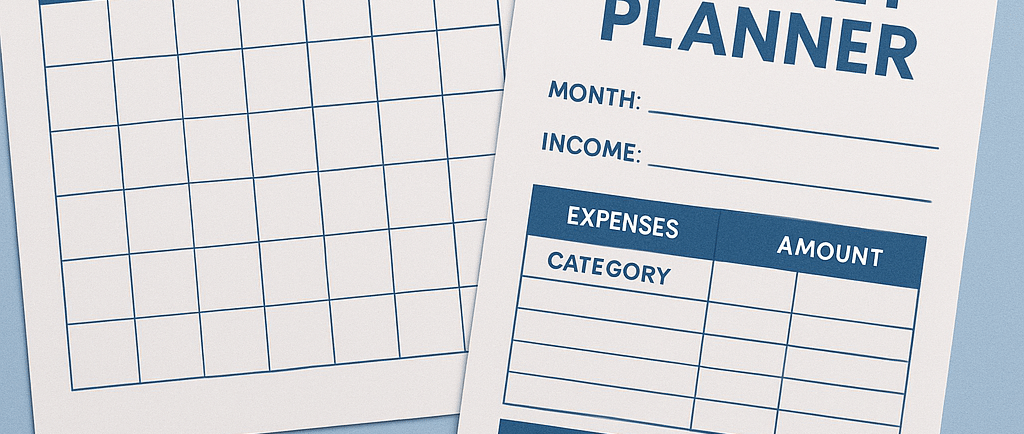Easy Monthly Budget Planning Tips
Discover simple and effective budget planning methods for planning your monthly budget. Learn how to manage your finances efficiently and make budgeting less time-consuming and more enjoyable.
SPENDING HABITS
What is Budget Planning? The Simple Associated Terms Explained


Planning A budget be it Weekly, Monthly or Yearly seems to be time consuming, confusing and boring job to do. If not weekly or yearly it’s always better to plan your monthly budget in simple and easy ways.
There are few terms which should be considered while planning your monthly budget.
1. Income
2. Fixed Expenses
3. Variable Expenses
4. Saving Goal
5. Framework
6. Tracking
7. Reviewing
8. Flexible
9. Accountable
10. Affirmations
What are 10 Steps towards Planning a Monthly Budget?
Step 1: What are Your sources of Income?
The first thing which we have to decide and jotted down is the source of income. Divide the total income into regular and irregular income. Regular income like Monthly Salary, Monthly Pension, Monthly Rental Income credited to your accounts. There may be some irregular income like income from side hustles, freelancing, consulting and Part-Time jobs. Add up all the irregular income source and calculate them on monthly average basis.
Now the last thing Add the Regular + Irregular Income to get the Total Income of the particular month.
Step 2: What are Your Fixed Expenses
Next you decide which are the fixed expenses that gets debited from your account every month or in simple words these are the same amount getting spent every month. like EMI, Rent, Fees, Subscriptions and other Utilities.
Step 3: What are your Variable Expenses?
These are the incomes where the commodities remain same but the amount spending is different for every month. Variable expenses include Groceries, Recahrge Plans, Transportation, Medical Care, Shopping and Entertainment. These are the important part of the budgeting plan which we have to keep in records.
Step 4: How to set your Saving Goals?
Saving Goal should be 20 % of total income for investments and emergency funds. Whatever be your income always keep a hefty amount for an emergency purpose. It should be minimum of 1lakh in cash and 1lakh in your savings account. For students and beginners’ amount can vary but should be 20% of total income.
Step 5: How to decide your framework for planning the monthly budget?
Decide the Framework for Necessity, Luxury and Saving. The Framework Rule: 50% - 30% - 20% Rule. Spend 50% on necessity commodities, 30% on luxury commodities and the remaining 20% in savings.
Step6: How to track every expenditure on monthly basis?
For tracking we can use various online offline tools and products
like Printable Digital Journal, Editable Digital Journal, Printable PDF Planners, Editable PDF Planners, Normal Diary, Notebook, Excel sheets in your mobile application, Google Sheets in your mobile application. The above-mentioned tracking methods are offline.
If we are tech savvy then we can also use budgeting applications and tools available at online platforms.
Step 7: How to set Reminder for reviewing
At the end of every month set a reminder to see and review what went right and what went wrong. On what things you overspend, and then adjust your plan for next month
Step 8: Be Flexible and Accountable
Budgeting means we can often go offtrack, we can sometimes overspend and budgeting isn’t about perfection. Budgeting means to get yourself on track and aim for perfection. Be flexible in your approaches and be accountable with all your expenditures. The main aim should to revise and restart.
Step 9: Bucket list
Save a bucket list like: the premium commodities we want to buy, costly experiences we want to do, the places we want to travel, the luxurious experiences we want to enjoy like dinning out in premium restaurants, staying in premium hotels, travelling in business class and many more. Update and at the end of each month see what you did, what you didn’t, what you want to repeat and what you don’t want to repeat. It’s our list we can change that and customize it.
Step 10: Affirmations
Keeping ourselves affirmative in all situation. Affirmations at the end of the month is to plan your budget tactfully and be mindful and keeping ourselves flexible for new approaches to be taken for the upcoming months.
Closing Remarks
A well planned budget reflects who you are , what you value and where you are headed.



